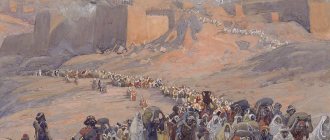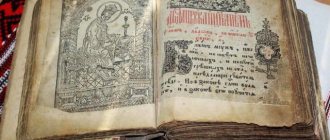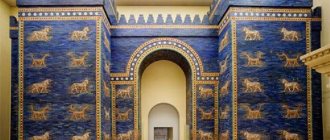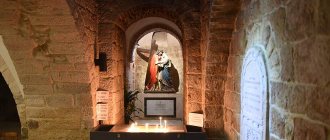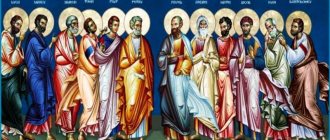Text of prayer Psalm 136
The most popular versions of the text of Psalm 136 are Hebrew, Old Church Slavonic, and Latin. In churches, the Slavic version of the church is used, and at home the believer can read the text in Russian.
In Church Slavonic with accents
David Jeremiah.
1 On the rivers of Babylon, gray-haired and weeping tamo, always remember us, O Zion.
2 Su verbih, in the middle of it, both of our organs.
3 When you ask us the words of the songs and tell us about the song, sing to us the praises of the songs of Zion.
4 How can we sing a song to the Lord in foreign countries?
5 If I forget you, O Jerusalem, oblivion will be my right hand.
6 Put my tongue to my throat, if I do not remember you, if I do not offer Jerusalem, because in the beginning of my joy.
7 Remember, O Lord, children of Edom, on the day of the glorification of Jerusalem: dry it up, drain it to the ground.
8 Damned children of Babylon! The Blessed Ones will reward you with a reward, we have rewarded you.
9 Blessed is he, and he will crush your children against the stone.
In Russian
David through Jeremiah.
1 There we sat by the rivers of Babylon and wept, remembering Zion;
2 We hung our harps on the willows in the midst of them.
3 There those who enchanted us asked for the words of a song, and the oppressors asked for joy: “Sing us the songs of Zion.”
4 How can we sing the song of the Lord in a foreign country?
5 If I forget you, O Jerusalem, forget me, my right hand;
6 Put your tongue down my throat if I do not remember you, if I do not put Jerusalem at the head of my joy.
7 Remind the children of Edom, O Lord, of the day of Jerusalem when they said, “Destroy it, destroy it to the ground.”
8 Daughter of Babylon, destroyer! Blessed is he who rewards you for what you have done to us!
9 Blessed is he who seizes and crushes your children against a stone!
“On the Rivers of Babylon”: Commentary on Psalm 136
Source: Pravoslavie.Ru
February 15/28, 2022 – Sunday of the Prodigal Son, the second preparatory week for Lent. On the eve of this day, at the all-night vigil, the 136th Psalm “On the Rivers of Babylon” is sung. We offer readers of the website Pravoslavie.Ru a theological and philological commentary on this chant.
The Great Pentecost is preceded by four preparatory weeks. During this period, the Lenten Triodion offers many liturgical texts that prepare us for Lent. Thus, at Matins on the Sunday of the Prodigal Son and then on the Sunday of Meat and Cheese, after the singing of the polyelean psalms (134 and 135) “Praise the name of the Lord” and “Confess the Lord”, Psalm 136 “On the rivers of Babylon” is also sung.
The Typikon, giving liturgical instructions at Matins on the Sunday of the Prodigal Son, instructs us to sing the third psalm to the two polyeleos psalms: “On the rivers of Babylon” with a red alleluia[1]. The Church Slavonic phrase “red alleluia” is literally translated as “beautiful alleluia”[2]. It can be noted that the Typikon, prescribing this psalm to be sung in this way, sets it apart from the background of the previous two psalms.
Psalm 136 consists of nine verses. In the Church Slavonic texts of the Bible it is entitled with the words: “To David Jeremiah”[3]. In the Hebrew Bible, the psalm is not inscribed with the name of the author; in the Latin and Greek Bibles the name of David is written[4].
There are different opinions regarding the authorship of Psalm 136. The strong nostalgia for the homeland clearly expressed in it (verses 5-6) suggests that the author was among those captives who, after the decree of the Persian king Cyrus in 538 BC, returned to the destroyed Jerusalem.
The Church Slavonic text of Psalm 136 is as follows:
“To David Jeremiah.
On the rivers of Babylon, there weeping and lamenting, we will never remember Zion. On the willows in the middle of both of them are our organs. For there they asked us, captivating us about the words of the songs and leading us about singing: sing to us from the songs of Zion. How shall we sing the song of the Lord in foreign lands? If I forget you, O Jerusalem, my right hand will be forgotten. Cling my tongue to my throat, lest I remember you, lest I offer Jerusalem, as at the beginning of my joy. Remember, O Lord, the sons of Edom, who said on the day of Jerusalem: exhaust, exhaust it to its foundations. Accursed daughter of Babylon, blessed is she who will give you the reward that you have given to us. Blessed is he who hath, and shall dash thy infants against the stone.”[5]
Babylonian captivity
“On the rivers of Babylon” - the use of the plural in the phrase “by the rivers” (Kyiv translation) refers to the various areas along the Tigris and Euphrates rivers with their tributaries and artificial canals built by the Babylonians to irrigate their fields, where captive Jewish families were located and lived[ 6].
The plural of the verbs “sadohom and weeping” refers to the communication of the captives among themselves. They cry together and empathize with each other, remembering Zion - in this case, the word is associated with Jerusalem or the Temple.
We are in captivity to sin - “on the rivers of Babylon”
“On the willows... obesikhom” - the Church Slavonic verb “obesiti”, as well as the Greek “κρεμασθῆναι”, in the context of the 2nd verse is translated into Russian as “hanged”.
“Our organs” – the Greek text contains the word ὄργανα. It was borrowed into the Church Slavonic text without translation. The word ὄργανα is translated into Russian as “instruments”, while reading the synodal translation, we can understand that we are talking about musical instruments: “we hung our harps.” Musical instruments hung on trees indicate that the Jews put aside their fun.
The chant “On the Rivers of Babylon” reveals the whole meaning of Lent from the first verses. We are in captivity to sin - “on the rivers of Babylon.” Like the Jews, we need to put aside fun and think about our sins, remember Zion - the Kingdom of Heaven or Heavenly Jerusalem.
Songs of Zion
“For there they asked us, having taken us captive about the words of songs and leading us about singing: sing to us from the songs of Zion”: if translated from Hebrew, this verse reads like this: “There those who captivated us demanded from us the words of songs; and our oppressors - joy: sing to us from the songs of Zion."
“Voprosisha” - “ordered” or “demanded.” The captive Babylonians demanded that the Jews tell them a few words from the Divine songs and praises that they sang in Jerusalem[7].
“How can we sing the Lord’s song in a foreign land?” - this is how the fourth verse can be translated. “Why weren’t they allowed to sing in a foreign land? Because unclean ears should not have heard these mysterious chants,”[8] St. John Chrysostom interprets this passage[9].
“A foreign land” is not just a country far from the holy city, it is an unclean pagan land (see: Ezek. 4: 13–14), which provided “unclean bread.”
Saint John Chrysostom calls on us to observe ourselves with special care and build our real lives in such a way that we do not become captives, aliens and excommunicated from our fatherly city[10]. “We will all listen to this and learn from it. Just as when they were deprived of the city, then they began to look for it, so many of us will experience the same thing when on that day we are deprived of the heavenly Jerusalem,” [11] - this is how St. John comments on the 136th Psalm.
Jerusalem - the beginning of the fun
“If I forget you, O Jerusalem, my right hand will be forgotten. Cling my tongue to my throat, lest I remember you, lest I offer Jerusalem, as at the beginning of my joy”: the fifth and sixth verses are built on the principle of an oath: “If I forget, let my right hand forget me; If I don’t remember, let my tongue stick to the roof of my mouth.” The author of the psalm is ready to be punished for breaking his vows, that is, if he does not make Jerusalem the beginning of his rejoicing, may the Lord take away from him the opportunity to play the harp with his right hand, and forbid his tongue to sing the songs of Zion.
And the singing of this psalm in the preparatory period for Lent calls on us to make Jerusalem, the Kingdom of Heaven, the beginning of our joy.
Sons of Edom
The psalmist, turning to God, prays to the Lord that He would remember the atrocities of the Edomites that they committed during the destruction of Jerusalem in 587 BC. (see: Obd. 1: 10-15): “Remember, O Lord, the sons of Edom, who said on the day of Jerusalem: exhaust, exhaust it to its foundations.”
The Edomites, a kindred people to the Jews, were always hostile to their brother and took an active and evil part in all the sad events of his life (see: Amos 1: 11).
And the “day of Jerusalem” is the day when Jerusalem was completely destroyed, the city was deprived of defensive walls and towers, literally “stripped” (Is. 3: 17).
Daughter of Babylon
“Accursed daughter of Babylon, blessed is she who will give you your reward, even as you have rewarded us” - in the Russian translation of the psalm, the daughter of Babylon is called a devastator. The Greek text calls her “wretched” (ταλαίπωρος[12]), hence the word “cursed” - unhappy, pitiful[13].
The unsightly expression “blessed is he who takes and dashes your little ones against a stone,” according to some commentaries on the Psalter, indicates the crude and inhumane features of the Israeli religion. No matter how we feel about the words of the psalm, the psalmist, apparently, does not wish death for all the innocent children of Babylon, but asks the Lord to remember the very specific destroyers what they did to Zion.
“Babies” is an image of the beginnings of small indulgences and annoyances that can grow into ineradicable passions
And in spiritual life, many things can be compared to babies - this is the image of the beginnings of small indulgences and annoyances, which can grow into deep, ineradicable passions and vices. Now they seem so small and defenseless that it is somehow even cruel to resist them[14]. But it is precisely at this initial stage that it is necessary to fight them - “blessed is he who breaks them against a stone.”
***
Psalm 136, which is sung only three times a year during the all-night vigil during the preparatory weeks, shows us the great disappointment of the Jewish people, who lost their shrine - Jerusalem. The text also encourages us to think about the price of the great blessings that the Lord gives us.
Without any doubt, the sadness and tears of the Jewish captives should inspire us to cherish all the gifts sent from God.
Professor Larisa Marsheva, Petr Gramatik
[1] Typikon, siest Charter. M.: Publishing Council of the Russian Orthodox Church, 2002. P. 825.
[2] Dictionary of the Russian language XI–XVII centuries. Vol. 8. M., 1981. pp. 19–20.
[3] Psalms. M., 2013. P. 367.
[4] Explanatory Bible, or Commentaries on all the books of the Holy Scriptures of the Old and New Testaments, edited by A.P. Lopukhina. M., 2009. P. 512.
[5] Psalms. P. 367.
[6] Explanatory Bible, or Commentaries on all the books of the Holy Scriptures of the Old and New Testaments, edited by A.P. Lopukhina. P. 513.
[7] Razumovsky G., archpriest. Explanation of the Holy Book of Psalms. M., 2002. P. 822.
[8] John Chrysostom, Saint. Conversations on the Psalms // St. John Chrysostom. Creations. T. 5. Book. 1. St. Petersburg, 1899. P. 451.
[9] Ibid.
[10] Razumovsky G., archpriest. Explanation of the Holy Book of Psalms. P. 822.
[11] John Chrysostom, Saint. Conversations on the Psalms // Creations. T. 5. Book. 1. P. 451.
[12] Liddell HG, Scott. R. Greek-English Lexicon. Oxford, 1996. P. 1753.
[13] Dictionary of the Russian language XI–XVII centuries. Vol. 12. M., 1987. P. 320.
[14] Lewis K. Reflections on the Psalms // Lewis K. Collected Works. T. 8. M., 2008. P. 334.
History of writing
In many versions, the authorship of King David is unsigned. The Greek and Latin versions still contain the king's name. The Psalms were written during the reign of King David.
At that time, the Jewish people were going through difficult times. This song of praise tells about the life of the Jews during the fall of Jerusalem. This happened in the 6th century BC. The Babylonian army forcibly invaded the ancient city, destroying everything, even the Temple of the Lord. This was the only temple where God was worshiped; all the inhabitants of the city were captured. People were lost, they lost not only their home, but also their religion.
Interpretation of Psalm 136
The text of the 136th prayer psalm, the interpretation of which we offer, brings with it the pain of the entire Jewish people. In every row you can hear the emptiness and crying of people.
Verses 1-3: Describes the life of the Babylonians. The extraordinary nature of the Euphrates and Tigris rivers is described. And the banks of these rivers became the favorite representatives of the Jewish tribes. Many people know that Jews were very musical. They fell asleep and woke up singing. Most of the songs and poems of the people glorified the Lord and were religious.
Verses 4-6: Every Jew cannot afford to forget his city and his home. The first and most important dream of people is to restore their city so that life in it can flourish.
Verses 7-9: Despite the fact that the Jewish people have always been kind and not warlike, they have always had enemies. One of them is the Edomites. They rejoiced at the fall of Jerusalem.
Publication by the successors of A.P. Lopukhin. Explanatory Bible. Interpretation of the Psalter
| SEARCH | FORUM |
Psalm 136
[David]
In the Hebrew Bible, the psalm is not inscribed with the name of the author, but in the Latin and Greek the name of David is written. The last indication cannot be considered correct: the content of the psalm (verses 1-3) represents the memory of the Babylonian captivity after its end and the return of the Jews to their homeland, events of which David could not have been a witness. The very nature of the presentation is a lively and touching story of the author about what he experienced, which also could not have been experienced by David. A more precise definition of the time of writing the psalm can be found in the indications of verses 8 and 9, where Babylon appears formidable and not yet devastated. From a comparison of the contents of the first three verses of the psalm and the last two, we can conclude that the psalm was written shortly after the return of the Jews from captivity under Cyrus the Persian before the devastation of Babylon in 517 in the 6th year of Darius Hystaspes, which means before the completion and consecration of the second temple.
In Babylonian captivity our songs fell silent and the harps hung on the trees (1-2). Our oppressors asked us to sing from the songs of Zion. May my tongue and hand dry out if I sing and play in a foreign country and if I forget you, Jerusalem (3-6)! Lord, take revenge on Edom for his malice towards Jerusalem. Blessed is he who will dash your children into stone, O daughter of Babylon, the desolator (6-9).
1 By the rivers of Babylon, there we sat and wept when we remembered Zion;
1. “By the rivers of Babylon” - of course, the Tigris and Euphrates rivers, with their tributaries and artificial canals built by the Babylonians to irrigate their fields.
2 on the willows, in the middle of it, we hung our harps.
2. “On the willows.” Along the banks of numerous rivers and tributaries of the Babylonian lowland, many willows, or willows, grew. River banks were a favorite place for prisoners to visit.
3 There those who captivated us demanded words of song from us, and our oppressors demanded joy: “Sing to us from the songs of Zion.”
3. The Jewish people were one of the most musical peoples of the ancient East. The Jews were famous both for the abundance of poetic works and for the development of instrumental music. But the music and poetry of the Jewish people were of a religious nature: it concerned the chanting of God and Zion and had a prayerful content. She was closely tied to Palestine, the temple, and the various manifestations of God's guidance of the Jewish people. The singing of these songs therefore had a sacred and national significance. The request of the Babylonians that the Jews sing to them from the sacred Zion songs was just simple curiosity, entertainment, and the fulfillment of this request by the captive Jews was in the eyes of the latter a profanation, an insult to the holiness of the content of their poetry and their religious feeling, which is why it was indignantly rejected.
4 How can we sing the song of the Lord in a foreign land? 5 If I forget you, O Jerusalem, forget me, my right hand; 6 Let my tongue cleave to my throat, if I do not remember you, if I do not put Jerusalem at the head of my joy.
5-6. “Forget me, right hand” - stop acting, that is, dry up. - “Stick your tongue” - dry too. “Put Jerusalem at the head of the joy” - rejoice only in what is joy for all Jerusalem. During the captivity of the Jews, Jerusalem was devastated and was in ruins. Its settlement and restoration of its former significance for the Jewish people was the only dream and main joy for the captives.
7 Remember, O Lord, to the children of Edom the day of Jerusalem, when they said: “Destroy, destroy it to its foundations.”
7. The Edomites or Edomites, a related people to the Jews, were always hostile to their fellow man, and took an active and evil part in all the sad events of his life. This was the case during the destruction of Jerusalem by the Babylonians, when the Edomites rejoiced at this national disaster (see Am I:11; Obd 11-15 vv.).
8 Daughter of Babylon, desolator! blessed is he who repays you for what you have done to us! 9 Blessed is he who takes and dashes your little ones against a stone!
8-9. The prophet Isaiah (XIII:16-18) predicted the difficult fate of Babylon precisely by the features indicated in this psalm. The severity of this sentence is the immutable will of the Lord, which will inevitably come true and find its executor. The latter is called the blessed writer of the psalm, since he fulfills one of the Divine plans, and therefore just and beneficent, even if they seem cruel and heavy in the eyes of man.
The entire psalm perfectly conveys the sad, repentant mood in which the Jews lived in captivity, their longing for their homeland and the dream of their national revival.

